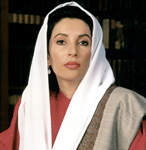Bhutto's death raises questions about security and control in Pakistan
 Islamabad/New Delhi, Dec.28: The death of Bhutto is an emotional event for many, and it is the sort of instability that Western nations have sought to avoid.
Islamabad/New Delhi, Dec.28: The death of Bhutto is an emotional event for many, and it is the sort of instability that Western nations have sought to avoid.
Her death marks a moment of decision for Pakistan's leaders and lays bare the terrorists' capabilities.
"Her death in such a manner - when the government had taken responsibility for her security - tells a lot about the situation in Pakistan," the Christian Science Monitor quoted Hassan Abbas, a Pakistan expert at Harvard University, as saying.
"What is evident is a complete lack of command and control," he added.
The killing of Bhutto leaves a question mark over whether elections can go forward. A political field without her will profoundly affect the larger political dynamic that Musharraf has been carefully crafting to remain in power, the CSM says.
"I think the elections will be cancelled. We can't have elections when the country is in this state of violence. We may see the imposition ... of extraordinary measures like martial law or a state of emergency, said Ahmed Rashid, a Pakistani security analyst and author of "Taliban.
The circumstances of Bhutto's death, and the failure of security, will be a subject of immense scrutiny.
"There are going to be very big questions asked," says Najmuddin Shaikh, who served as foreign minister during one of Bhutto's terms as prime minister.
Dr. Abbas at Harvard predicted that, "fewer people will challenge extremism openly."
"It may take months for the party to decide their new leader," says Hassan Aksari Rizvi, an independent political scientist in Lahore. (ANI)